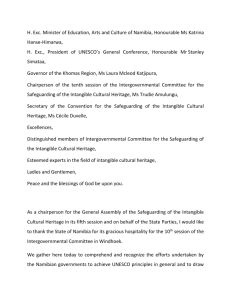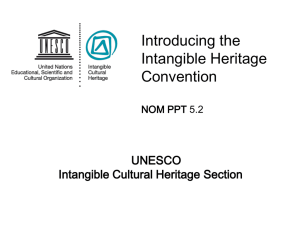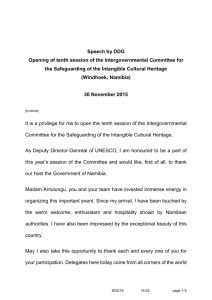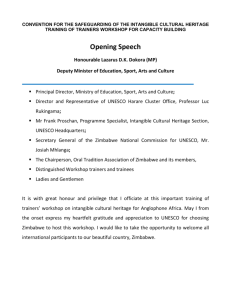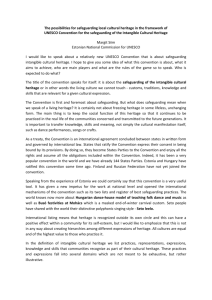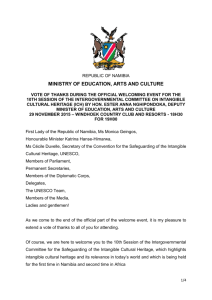ITH/12/7.COM/12.b – page 1 CONVENTION FOR THE
advertisement
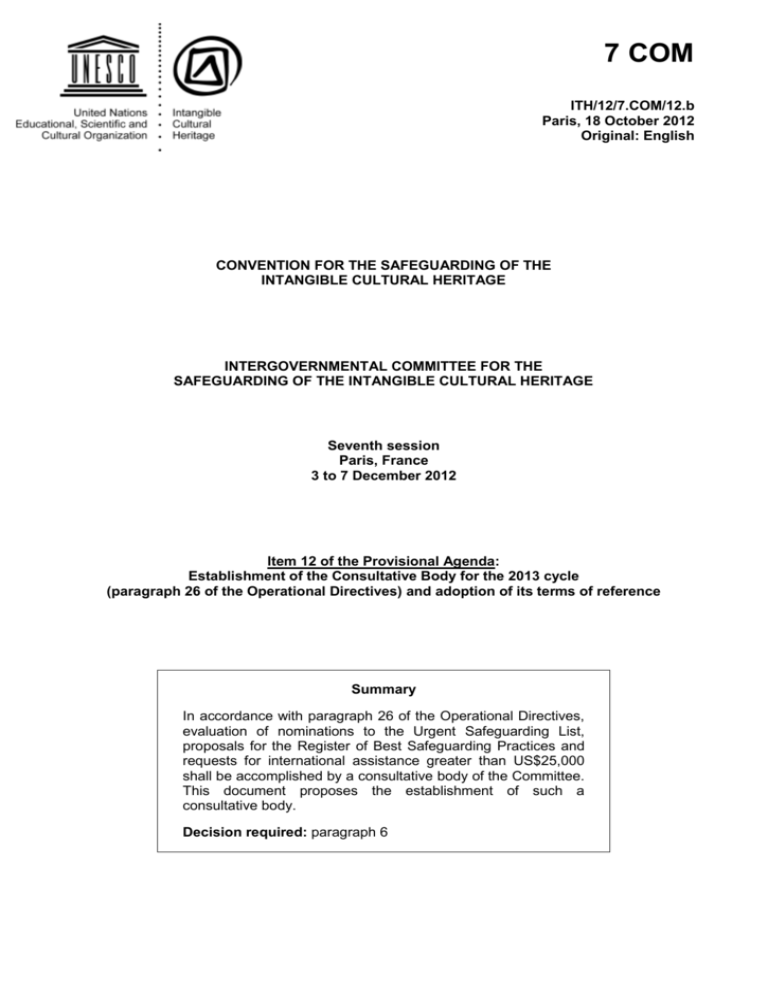
7 COM ITH/12/7.COM/12.b Paris, 18 October 2012 Original: English CONVENTION FOR THE SAFEGUARDING OF THE INTANGIBLE CULTURAL HERITAGE INTERGOVERNMENTAL COMMITTEE FOR THE SAFEGUARDING OF THE INTANGIBLE CULTURAL HERITAGE Seventh session Paris, France 3 to 7 December 2012 Item 12 of the Provisional Agenda: Establishment of the Consultative Body for the 2013 cycle (paragraph 26 of the Operational Directives) and adoption of its terms of reference Summary In accordance with paragraph 26 of the Operational Directives, evaluation of nominations to the Urgent Safeguarding List, proposals for the Register of Best Safeguarding Practices and requests for international assistance greater than US$25,000 shall be accomplished by a consultative body of the Committee. This document proposes the establishment of such a consultative body. Decision required: paragraph 6 ITH/12/7.COM/12.b – page 2 1. By virtue of paragraph 26 of the Operational Directives, evaluation of nominations for inscription on the Urgent Safeguarding List referred to in Article 17 of the Convention, proposals for the Register of Best Safeguarding Practices referred to in Article 18 and requests for international assistance greater than US$25,000 shall be accomplished by a consultative body of the Committee established in accordance with Rule 20 of its Rules of Procedure. 2. The Operational Directives, as revised most recently by the fourth session of the General Assembly in June 2012 (Resolution 4.GA 5), further indicate that ‘the Consultative Body shall be composed of six accredited NGOs and six independent experts appointed by the Committee, taking into consideration equitable geographical representation and various domains of intangible cultural heritage. The duration of office of a member of the Consultative Body shall not exceed four years. Every year, the Committee shall renew one quarter of the members of the Consultative Body’.. The establishment of a system of rotation is the subject of Document ITH/12/7.COM/12.a, and the Committee will be asked to decide on this system before proceeding to the present document. 3. Rule 20.2 of the Committee’s Rules of Procedure provides that the Committee shall define the composition and the terms of reference (including mandate and duration of office) of such consultative bodies at the time of their establishment. Annex 1 to the draft decision accordingly proposes a set of terms of reference for such a body, including its mandate and duration. 4. In conformity with paragraph 26 of the Operational Directives, every year, the Committee shall renew one quarter of the members of the Consultative Body. Annex 2 provides the names of twelve candidate NGOs and twelve candidate experts, together with a brief description of their respective competence and the domain(s) in which they have experience. This includes all of the twelve incumbents that have served on the Consultative Body for the past twelve months (identified as incumbents). As can be seen, most of the candidates have broad experience in several domains of intangible cultural heritage stipulated in Article 2.2 of the Convention. The Committee is asked to name three new members, as determined by the system of rotation it will have decided, and to renew the appointments of the other nine members. 5. Prior to presenting the names of potential members of the Consultative Body to the Committee, the Secretariat contacted the candidates to inform them of the nature of their tasks, the time schedule and the draft terms of reference annexed to the present document (Annex 1). The Secretariat confirms that they are all in principle available to carry out the required work, should the Committee decide to appoint them. Links to the accreditation forms and to the websites of the accredited NGOs, if any, and to curriculum vitae of the individual experts are indicated in Annex 2. 6. The Committee may wish to adopt the following decision: DRAFT DECISION 7.COM 12.b The Committee, 1. Having examined document ITH/12/7.COM/12.b, 2. Recalling Chapter V as well as Articles 17 and 18 of the Convention, 3. Further recalling paragraph 26 of the Operational Directives, 4. Establishes a consultative body for the evaluation in 2013 of nominations to the Urgent Safeguarding List, proposals for the Register of Best Safeguarding Practices and requests for international assistance greater than US$25,000, and adopts its terms of reference as presented in Annex 1 to this Decision, in accordance with Rule 20 of its Rules of Procedure; ITH/12/7.COM/12.b – page 3 5. Appoints the following accredited NGOs and experts as members of the Consultative Body for 2013: Accredited NGOs 1. XXXX 2. XXXX 3. XXXX 4. XXXX 5. XXXX 6. XXXX Independent experts 7. XXXX 8. XXXX 9. XXXX 10. XXXX 11. XXXX 12. XXXX ITH/12/7.COM/12.b – page 4 Annex 1 Terms of Reference of the Consultative Body for the 2013 cycle (paragraph 26 of the Operational Directives) The Consultative Body 1. shall be composed of six accredited NGOs and six independent experts selected by taking into consideration equitable geographical representation and various domains of intangible cultural heritage; 2. shall elect its Chairperson, Vice-Chair and Rapporteur; 3. shall hold private meetings in accordance with Rule 19 of the Rules of Procedure of the Committee; 4. shall be responsible for the evaluation of nominations to the Urgent Safeguarding List, proposals for the Register of Best Safeguarding Practices and requests for international assistance greater than US$25,000, in conformity with the relevant paragraphs of the Operational Directives for the implementation of the Convention. It shall, in particular, include in its evaluation: a. an assessment of the conformity of nominations to the Urgent Safeguarding List with its inscription criteria as provided in Chapter I.1 of the Operational Directives; including an assessment of the viability of the element and the feasibility and sufficiency of the safeguarding plan, and an assessment of the risks of its disappearing, as provided in Paragraph 27 of the Operational Directives; b. an assessment of the conformity of proposals for the Register of Best Safeguarding Practices with its selection criteria as provided in Chapter I.3 of the Operational Directives; c. an assessment of the conformity of requests for international assistance with the selection criteria as provided in Chapter I.4 of the Operational Directives; d. a recommendation to the Committee to inscribe or not to inscribe the nominated element on the Urgent Safeguarding List; to select or not to select the proposal for the Register of Best Safeguarding Practices; or to approve or not to approve the international assistance request; 5. shall provide the Committee with an overview of all files and a report of its evaluation; 6. shall cease to exist following submission to the eighth session of the Committee of the report of its evaluation of the files to be examined by the Committee in 2013. ITH/12/7.COM/12.b – page 5 Annex 2 Potential members of the Consultative Body Electoral Group I 1. Maison des cultures du monde (NGO-90098), France [incumbent, 2011 and 2012] Created in 1982 to promote cultural exchange programs between France and other countries around the world, the Maison des cultures du monde aims at promoting exchanges and dialogue between cultural expressions and identities, in particular by hosting cultural manifestations. The organization is internationally recognized for its field work and expertise in the area of cultural programming (shows, concerts, rituals, performances, meetings, exhibitions, etc.), in particular in the context of the annual Festival of the Imaginary. Accreditation form: NGO-90098 Website: http://www.mcm.asso.fr 2. International Society for Ethnology and Folklore – SIEF (NGO-90013), Netherlands As an international scholarly organization with over 350 members, International Society for Ethnology and Folklore (SIEF) facilitates cooperation among scholars and stimulates research and documentation in ethnology, folklore studies and related fields. SIEF organizes international congresses, scholarly working groups as well as smaller conferences and symposia. SIEF brings together scholars and various intangible cultural heritage communities, promoting thereby a close interaction between academia and the communities of intangible heritage practice. Accreditation form: NGO-90013 Website: http://www.siefhome.org 3. Mr Egil Sigmund Bakka, Norway [incumbent, 2012] As a specialist in traditional dance and other domains of intangible cultural heritage, Egil Bakka has undertaken extensive fieldwork in Norway, the Faroe Islands and Iceland. He holds a professorship in Dance Studies at the Norwegian University of Science and Technology and is Chair of the Committee for Traditional and Folk Costumes under the Norwegian Ministry of Culture and Church Affairs, as well as a member of several international boards and committees. He served the Committee as an examiner for a nomination to the Urgent Safeguarding List in 2009. Curriculum vitae 4. Ms Chiara Bortolotto, Italy Ms Chiara Bortolotto, anthropologist, is currently a researcher at the Free University of Brussels. Her research focuses on the implementation of the Intangible Cultural Heritage Convention at the national and local levels (inventories and safeguarding programs). Over the past five years she has worked on inventorying projects of intangible cultural heritage both in France and Italy. Ms Bortolotto is one of the facilitators for UNESCO’s global capacity-building strategy for the implementation of the Convention. Curriculum vitae ITH/12/7.COM/12.b – page 6 Electoral Group II 5. International Council for Traditional Music (NGO-90009), Slovenia [incumbent, 2012] International Council for Traditional Music (ICTM), whose secretariat is in Ljubljana, includes 1000 members in more than 100 countries. It aims to further the study, practice, documentation, preservation and dissemination of traditional music, including folk, popular, classical and urban music, and dance, of all countries. The Council organizes meetings, conferences, study groups and colloquia, maintains an active website and a membership directory and publishes journals and bulletins. It served the Committee as an examiner of a nomination to the Urgent Safeguarding List in 2009. Accreditation form: NGO-90009 Website: http://www.ictmusic.org 6. Česká národopisná společnost/ Czech Ethnological Society (NGO-90140), Czech Republic Česká národopisná společnost includes among its members advanced researchers in ethnology and related fields. It produces periodic reviews (the journal Narodopisny vestnik (Ethnology Bulletin) and occasional publications, maintains content-rich websites, organizes conferences and seminars as well as methodological training for its network. Its archives are used routinely by professionals, but also by communities trying to safeguard or revitalize their intangible cultural heritage. The Czech Ethnological Society served on the Consultative Body in 2011. Accreditation form: NGO-90140 Website: http://www.narodopisnaspolecnost.cz 7. Ms Rusudan Tsurtsumia, Georgia [incumbent, 2011 and 2012] Rusudan Tsurtsumia is an ethnomusicologist specializing in traditional polyphonic singing in the Caucasus. She has overseen the creation of an inventory of Georgian traditional polyphony in her capacity as Head of the Tbilisi State Conservatory’s Research Center on Traditional Polyphony. She served the Committee as an examiner for a nomination to the Urgent Safeguarding List in 2010. Curriculum vitae 8. Ms Kristiina Porila, Estonia Ms Kristiina Porila is an intangible cultural heritage specialist and member of the Chamber of Intangible Heritage in the Estonian Folk Culture Centre,. The Chamber aims at promoting intangible cultural heritage through the promotion of the UNESCO Convention for the Safeguarding of Intangible Cultural Heritage. The Chamber also manages the Estonian inventory of intangible cultural heritage. She served previously as a member of the Estonian team in the Subsidiary Body in 2010 and 2011. Curriculum vitae ITH/12/7.COM/12.b – page 7 Electoral Group III 9. Centro de Trabalho Indigenista – CTI (NGO-90174), Brazil [incumbent, 2012] The Centro de Trabalho lndigenista is a well-established national NGO founded in 1979. It works closely with indigenous communities, principally in Brazil, and assists them in various activities aimed at safeguarding their traditional knowledge and practices in order to enhance their transmission. Some of its most important actions today are documentation and promotion of the Guarani culture. Accreditation form: NGO-90174 Website: http://www.trabalhoindigenista.org.br 10. Cultural Interactivity and Development, A.C. (NGO-90075), Mexico The Cultural Interactivity and Development Association has been working over more than a decade on intangible cultural heritage, mainly along with local communities, helping them to promote development and social cohesion. It has partnered with communities to inventory their rituals, organize exhibits and meetings in villages and schools, but worked also with legislators in several states in Mexico. It assisted in the development of culture related legislation that incorporate key principles of the 2003 Convention for Safeguarding the Intangible Cultural Heritage and the 2005 Convention on the Protection and Promotion of the Diversity of Cultural Expressions. Accreditation form: NGO-90075 11. Ms Soledad Mujica, Peru [incumbent, 2012] As a communicator specialized in the promotion and diffusion of intangible cultural heritage, Soledad Mujica is Director of the Registry and Cultural Studies Department of the recently created Ministry of Culture of Peru and actively represented her government in the Intergovernmental Committee for the Safeguarding of the Intangible Cultural Heritage from 2006 to 2010. Author of many publications on traditional dance in Peru, she has more than thirty years of experience in safeguarding intangible cultural heritage. Ms Mujica is one of the facilitators for UNESCO’s global capacity-building strategy for the implementation of the Convention. Curriculum vitae 12. Ms Kris Rampersad, Trinidad and Tobago Kris Rampersad is a media, cultural and literary consultant, author, researcher, lecturer and journalist. She has more than 20 years of experience in media and more than eight years of experience in working with national and international organizations (including UNESCO and other UN agencies) and agencies in education, culture, gender, media and outreach. She has spent more than three decades focusing on development and issues of multiculturalism and diversity, with specific focus on the Caribbean and the developing world in global contexts. Ms Rampersad is one of the facilitators for UNESCO’s global capacity-building strategy for the implementation of the Convention. Curriculum vitae ITH/12/7.COM/12.b – page 8 Electoral Group IV 13. Trung tâm Nghiên cứu, Hỗ trợ và Phát triển Văn hóa/Centre for Research, Support and Development of Culture (A&C) (NGO-90131), Viet Nam [incumbent, 2012] Created in 2005 with the objective to strengthen co-operation between experts, communities and institutions in researching and safeguarding cultural heritage, the Centre focuses today on the development and support of training, research and safeguarding projects on national and international levels. The activities include capacity building in collection, conservation, promotion and revitalization of intangible cultural heritage. Accreditation form: NGO-90131 Website: http://www.acartculture.org.vn 14. International Organization of Folk Art – IOV (NGO-90154), Philippines The International Organization of Folk Art (IOV) is a worldwide organization of individuals and institutions organized for the purposes of documenting, preserving and promoting all forms of folk art, both tangible and intangible. IOV encourages and supports scholarly and scientific research, documentation and publication on topics related to all five domains of the ICH; supports national and international folk art festivals and events; and coordinates exchanges among practitioners of folk art, including performing folk arts troupes and handicraft artisans. Through its commissions, IOV coordinates the work of experts worldwide in performing arts, crafts, festivals and events, traditional food, oral traditions including folk tales myths and legends and folk costumes. Accreditation form: NGO-90154 Website: http://www.iov-world.com 15. Mr Rahul Goswami, India [incumbent, 2012] Rahul Goswami has extensive professional experience with issues related to sustainable development and indigenous peoples in India, South-East Asia and the Gulf region. In his capacity as an expert from the Goa Heritage Action Group, an accredited NGO working for rediscovering and rehabilitating cultural and social traditions, he was designated to serve the Committee as examiner of two nominations to the Urgent Safeguarding List (in 2009 and 2010) and two international assistance requests (in 2009). Mr Goswami is one of the facilitators for UNESCO’s global capacity-building strategy for the implementation of the Convention. Curriculum vitae 16. Ms Sajida Haider Vandal, Pakistan Ms Sajida Haider Vandal is the CEO of THAAP, a non-profit organization working on culture, art and architecture in Pakistan. She worked as professor of architecture at the National College of Arts (NCA), Lahore, from 2000-2007 and principal of NCA from 1990-1994 and from 1999-2007. Her main fields of expertise are architecture and urban planning, cultural heritage management and conservation, art and culture education, community development and empowerment of women. Ms Haider is one of the facilitators for UNESCO’s global capacity-building strategy for the implementation of the Convention. Curriculum vitae ITH/12/7.COM/12.b – page 9 Electoral Group V (a) 17. African Cultural Regeneration Institute – ACRI (NGO-90119), Kenya [incumbent, 2011 and 2012] African Cultural Regeneration Institute (ACRI) works to promote African culture by identifying relevant indigenous cultural values that Africa can use today for its own development. The efforts of ACRI are focused especially on the Meru (Ameru) people of Kenya, on whom it has produced a number of publications, and organized various festivals and activities; it is particularly active in the field of education for Meru youth. Accreditation form: NGO-90119 Website: http://www.acri.or.ke 18. The Cross-cultural Foundation of Uganda – CCFU (NGO-90274), Uganda The Cross-cultural Foundation of Uganda (CCFU) was created to promote the positive aspects of culture that can be harnessed to bring about social and economic transformation. CCFU works towards the recognition of culture as vital for human development. Under their Promotion of Cultural Heritage program and with support from UNESCO, CCFU has supported 21 community museums and cultural centres throughout the country by mapping the existing initiatives and their needs. In November 2010, it launched the publication of four case-studies, illustrating the significance of intangible cultural heritage in relation to contemporary development challenges. Accreditation form: NGO-90274 Website: http://www.crossculturalfoundation.or.ug 19. Ms Claudine-Augée Angoué, Gabon [incumbent, 2011 and 2012] Claudine-Augée Angoué is an anthropologist and professor at the Department of Sociology at the University Omar-Bongo of Gabon. From 2004 to 2007, she was a technical advisor to the Ministry of Culture and Arts and popular education and participated as a Gabonese representative in sessions of the Intergovernmental Committee for the Safeguarding of the Intangible Cultural Heritage. Ms Angoué is one of the facilitators for UNESCO’s global capacity-building strategy for the implementation of the Convention. Curriculum vitae 20. Mr Ilmi Awaleh, Djibouti Mr Ilmi Awaleh has led and participated in a number of projects in Djibouti aiming to highlight the role that culture could play in development, and specifically to identify and to safeguard elements of intangible cultural heritage in Djibouti. He was instrumental, amongst other activities, in implementing the UNESCO/Japanese Funds in Trust project (2006-2009) on traditional games of Afar and Somali people, as well as in raising awareness on the importance of the 2003 Convention in cooperation with the Ministry of Culture in Djibouti. He is a founding member and former President (2006-2007) of the Peace & Milk Association (APL) which undertakes development projects in the field of culture, public health and education. Specializing in public health and nutrition, he has a particular interest in traditional foodways of East Africa. Curriculum vitae ITH/12/7.COM/12.b – page 10 Electoral Group V (b) 21. جمعية لقاءات للتربية والثقافات/Association Cont’Act pour l’éducation et les cultures (NGO-90074), Morocco [incumbent, 2011 and 2012] L’Association Cont’Act pour l’éducation et les cultures was created by professors, researchers and artists to promote cultural heritage and popular arts in Morocco through the education of young people. It focuses on transmission of cultural and tradition values, conducting research on oral traditions throughout Morocco and organizing festivals on popular arts and traditions involving communities from the Maghreb and Middle East. Accreditation form: NGO-90074 22. ال ش ع ب ية ل لمأث ورات ال م صري ة ال جم ع ية/Egyptian Society for Folk Traditions (NGO-90182), Egypt The Egyptian Society for Folk Traditions (ESFT) is an NGO working on documentation, preservation, researching and safeguarding the Egyptian folk traditions. It is carrying out many activities related to defining and documenting intangible cultural heritage of Egypt. ESFT implemented several projects in this field, such as the scientific studies for the Al Zawya Al Hamaraa Library project and the contents of the National Museum of Egyptian Civilization, both in Cairo. Accreditation form: NGO-90182 Website: http://www.esft-eg.org 23. Mr Abderrahman Ayoub, Tunisia [incumbent, 2011 and 2012] Abderrahman Ayoub is a researcher currently in charge of the Intangible Heritage Institute of Tunisia. He holds a Ph.D. in linguistics and has been conducting research for many years on oral literature, ethnography and arts in the Maghreb. He is the author of many publications and has recently been working on safeguarding traditional games in Tunisia. Mr Ayoub is one of the facilitators for UNESCO’s global capacity-building strategy for the implementation of the Convention. Curriculum Vitae 24. Ms Annie Tohme-Tabet, Lebanon Annie Tohme-Tabet holds a doctorate in sociology from the University of Saint Joseph in Beirut, Lebanon, where she currently works as Associated Professor in the Department of Sociology and Anthropology. Throughout her carrier she focused her research and teaching work on several areas, including socio-linguistics; intercultural, family, gender and identity issues, as well as local and urban development. She has large experience in research, teaching and project coordination and she has published a number of articles and papers in the above-mentioned areas. Ms Tohme-Tabet is participating in the MEDLIHER project that aims at strengthening the implementation of the Convention in the Mediterranean area. Ms Tohme-Tabet is one of the facilitators for UNESCO’s global capacity-building strategy for the implementation of the Convention. Curriculum Vitae
